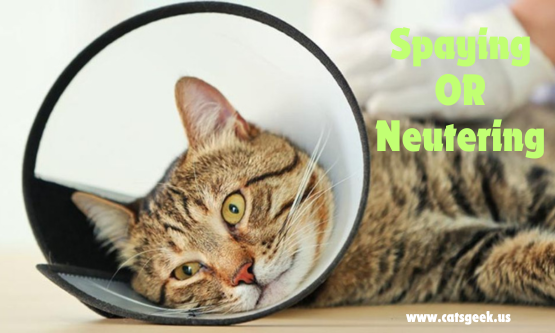Spaying or neutering your cat is one of the most important decisions you can make for their long-term health and behavior. This procedure offers numerous benefits, not just for your individual pet, but also for the broader cat population. Below are the key benefits of spaying or neutering your cat.
1. Preventing Overpopulation
- Reducing Stray Cat Populations: Every year, millions of cats are left homeless or are euthanized due to overpopulation. By spaying or neutering your cat, you help prevent unwanted litters and reduce the number of stray and feral cats.
- Fewer Cats in Shelters: Spaying and neutering help lower the number of cats that end up in animal shelters, improving the chances of adoption for those already in need of homes.
2. Health Benefits
- Prevents Certain Cancers: Spaying (removing the ovaries and uterus) eliminates the risk of ovarian and uterine cancers in female cats. It also reduces the risk of breast cancer, especially if done before the first heat cycle.
- Reduces Risk of Testicular Cancer: Neutering male cats eliminates the possibility of testicular cancer and reduces the risk of prostate problems.
- Prevents Pyometra: Pyometra is a life-threatening infection of the uterus that can occur in unspayed female cats. Spaying prevents this condition altogether.
- Improved Life Expectancy: Spayed or neutered cats tend to live longer because they are less prone to certain cancers and infections.
3. Behavioral Benefits
- Reduced Aggression: Neutering male cats decreases aggressive behaviors linked to mating instincts, such as fighting with other cats. This can also reduce the likelihood of injuries and infections caused by fights.
- Less Roaming: Unspayed and unneutered cats often roam far from home in search of mates, increasing the risk of getting lost, hit by cars, or involved in fights. Neutered and spayed cats are more content to stay closer to home.
- Decreased Marking and Spraying: Unneutered male cats often spray strong-smelling urine to mark their territory, especially if they sense the presence of other cats. Neutering typically reduces or eliminates this behavior.
- Elimination of Heat Behaviors: Female cats that are not spayed go into heat multiple times a year, which can result in loud, attention-seeking behavior such as yowling, restlessness, and attempts to escape to find a mate. Spaying prevents these cycles, leading to a calmer pet.
4. Cost Savings
- Reduced Vet Bills: Spaying or neutering your cat can save you money in the long run by preventing serious health issues such as cancers and infections. Additionally, it eliminates the costs associated with caring for unexpected litters.
- Lower Costs for Pet Care: Cats that roam less, fight less, and have fewer health issues due to spaying/neutering generally require fewer trips to the vet for injuries or illnesses.
5. Improved Relationships with Owners
- Better Companions: Spayed or neutered cats often exhibit more affectionate and relaxed behavior. They tend to be less driven by their hormones, making them more focused on bonding with their human family members.
- Fewer Behavioral Problems: Reduced aggression, less roaming, and a calmer demeanor contribute to a more pleasant and manageable pet.
6. Ethical and Social Responsibility
- Promoting Responsible Pet Ownership: Spaying and neutering your cat is a key part of responsible pet ownership. By preventing unwanted litters, you are helping to reduce the strain on animal shelters and decrease the number of stray animals in the community.
- Support for Animal Welfare: Many animal welfare organizations advocate for spaying and neutering as part of a broader effort to control pet populations humanely and reduce the euthanasia of healthy but unadopted animals.
When Should You Spay or Neuter Your Cat?
- Optimal Age: Most veterinarians recommend spaying or neutering cats before they reach sexual maturity, typically around 4-6 months of age. This is early enough to prevent unwanted behaviors associated with mating and reduce the risk of certain cancers.
- Consult Your Vet: Your veterinarian can provide guidance on the best time to spay or neuter your cat based on their health, breed, and lifestyle.
Conclusion
Spaying or neutering your cat provides significant health, behavioral, and societal benefits. By preventing overpopulation, improving your cat’s health, reducing problematic behaviors, and promoting responsible pet ownership, this procedure ensures a better quality of life for both your pet and the community. Always consult your veterinarian for the best advice and timing for your specific cat.






